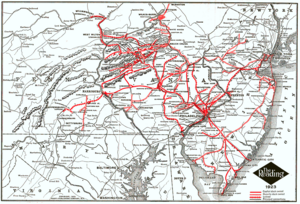Reading Cinemas
 |
|

Reading Railroad system map, 1923
|
|

Reading Terminal, circa 1893
|
|
| Reporting mark | RDG |
|---|---|
| Locale |
Delaware Maryland New Jersey Pennsylvania |
| Dates of operation | 1833–1976 |
| Successor | Conrail (now Norfolk Southern and CSX) |
| Track gauge | 4 ft 8 1⁄2 in (1,435 mm) standard gauge |
| Length | 1,460 miles (2,350 kilometres) |
| Headquarters | Philadelphia, Pennsylvania |
The Reading Company (pronounced Redding /ˈrɛdɪŋ/; logotyped as Reading Lines) operated a railroad in southeast Pennsylvania and neighboring states from 1924 until 1976.
Commonly called the Reading Railroad, it was a successor to the Philadelphia and Reading Railway Company founded in 1833. Until the decline in anthracite loadings in the Coal Region after World War II, it was one of the most prosperous corporations in the United States.
Competition with the modern trucking industry that used the Interstate highway system for short distance transportation of goods, also known as short hauls, compounded the company's problems, forcing it into bankruptcy in the 1970s. Its railroad operations were merged into Conrail in 1976, but the corporation lasted into 2000, disposing of valuable real estate holdings.
The Philadelphia and Reading Railroad (P&R) was one of the first railroads in the United States. Along with the Little Schuylkill, a horse-drawn railroad in the Schuylkill River Valley, it formed the earliest components of what became the Reading Company. Primarily, the P&R was constructed to haul anthracite coal from the mines in northeastern Pennsylvania's Coal Region to Philadelphia.
The original P&R mainline extended south from the mining town of Pottsville to Reading and then onward to Philadelphia, following the gently graded banks of the Schuylkill River for nearly all of the 93-mile journey. The line contained double track upon its completion in 1843.
...
Wikipedia
